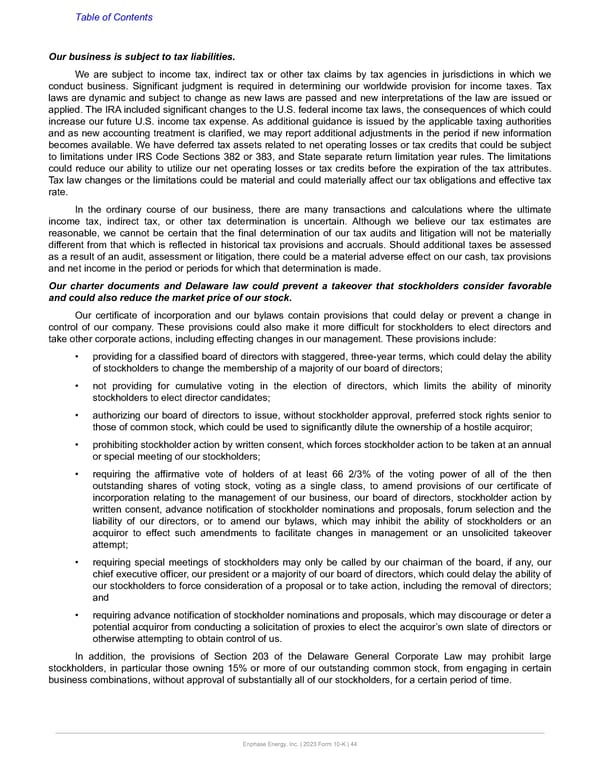Table of Contents Our business is subject to tax liabilities. We are subject to income tax, indirect tax or other tax claims by tax agencies in jurisdictions in which we conduct business. Significant judgment is required in determining our worldwide provision for income taxes. Tax laws are dynamic and subject to change as new laws are passed and new interpretations of the law are issued or applied. The IRA included significant changes to the U.S. federal income tax laws, the consequences of which could increase our future U.S. income tax expense. As additional guidance is issued by the applicable taxing authorities and as new accounting treatment is clarified, we may report additional adjustments in the period if new information becomes available. We have deferred tax assets related to net operating losses or tax credits that could be subject to limitations under IRS Code Sections 382 or 383, and State separate return limitation year rules. The limitations could reduce our ability to utilize our net operating losses or tax credits before the expiration of the tax attributes. Tax law changes or the limitations could be material and could materially affect our tax obligations and effective tax rate. In the ordinary course of our business, there are many transactions and calculations where the ultimate income tax, indirect tax, or other tax determination is uncertain. Although we believe our tax estimates are reasonable, we cannot be certain that the final determination of our tax audits and litigation will not be materially different from that which is reflected in historical tax provisions and accruals. Should additional taxes be assessed as a result of an audit, assessment or litigation, there could be a material adverse effect on our cash, tax provisions and net income in the period or periods for which that determination is made. Our charter documents and Delaware law could prevent a takeover that stockholders consider favorable and could also reduce the market price of our stock. Our certificate of incorporation and our bylaws contain provisions that could delay or prevent a change in control of our company. These provisions could also make it more difficult for stockholders to elect directors and take other corporate actions, including effecting changes in our management. These provisions include: • providing for a classified board of directors with staggered, three-year terms, which could delay the ability of stockholders to change the membership of a majority of our board of directors; • not providing for cumulative voting in the election of directors, which limits the ability of minority stockholders to elect director candidates; • authorizing our board of directors to issue, without stockholder approval, preferred stock rights senior to those of common stock, which could be used to significantly dilute the ownership of a hostile acquiror; • prohibiting stockholder action by written consent, which forces stockholder action to be taken at an annual or special meeting of our stockholders; • requiring the affirmative vote of holders of at least 66 2/3% of the voting power of all of the then outstanding shares of voting stock, voting as a single class, to amend provisions of our certificate of incorporation relating to the management of our business, our board of directors, stockholder action by written consent, advance notification of stockholder nominations and proposals, forum selection and the liability of our directors, or to amend our bylaws, which may inhibit the ability of stockholders or an acquiror to effect such amendments to facilitate changes in management or an unsolicited takeover attempt; • requiring special meetings of stockholders may only be called by our chairman of the board, if any, our chief executive officer, our president or a majority of our board of directors, which could delay the ability of our stockholders to force consideration of a proposal or to take action, including the removal of directors; and • requiring advance notification of stockholder nominations and proposals, which may discourage or deter a potential acquiror from conducting a solicitation of proxies to elect the acquiror’s own slate of directors or otherwise attempting to obtain control of us. In addition, the provisions of Section 203 of the Delaware General Corporate Law may prohibit large stockholders, in particular those owning 15% or more of our outstanding common stock, from engaging in certain business combinations, without approval of substantially all of our stockholders, for a certain period of time. Enphase Energy, Inc. | 2023 Form 10-K | 44
 Annual Report Page 43 Page 45
Annual Report Page 43 Page 45